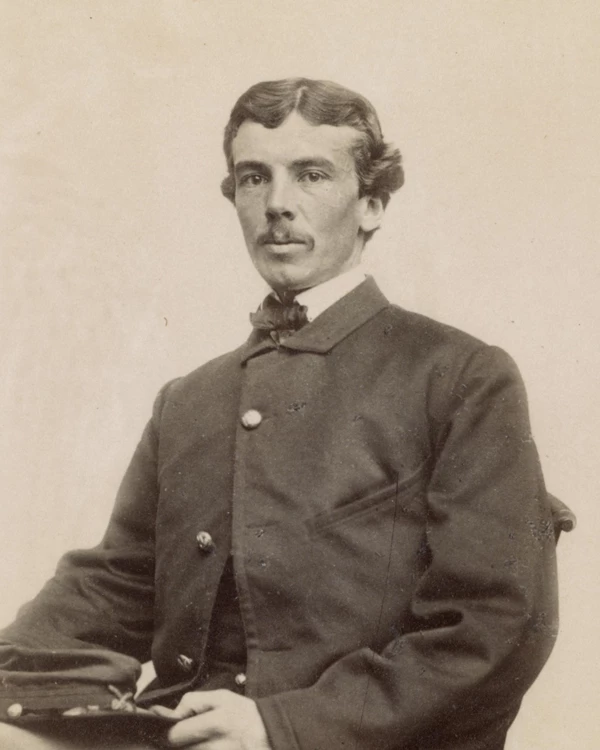Last updated: December 28, 2024
Person
Charles Russell Lowell

Library of Congress
Charles Russell Lowell, Jr., was a US Army cavalry commander killed at the Battle of Cedar Creek in 1864. His wife, Josephine Shaw, became an avid social reformer and his brother-in-law, Robert Gould Shaw, served as Colonel of the 54th Massachusetts Volunteer Infantry Regiment.
Becoming a Soldier
A native of Boston and a graduate of Harvard, Lowell was not a professional soldier. He traveled to Europe, worked in a foundry, and became a railroad executive without knowing he had a talent for military leadership. The Civil War changed Lowell’s life. He became a citizen soldier, not a West Pointer, who adapted well to army life and the horrors of combat. Lowell was dedicated to the abolition of slavery, wrote impressive letters to politicians, and was rewarded with a regular commission in the 6th US Cavalry in July 1861. He first saw combat during General George McClellan’s Peninsula campaign of 1862. Lowell served as a staff officer for McClellan during the Antietam campaign, adding to his reputation for coolness in action.
In Command
Given command of a new cavalry regiment, the 2nd Massachusetts, Lowell recruited men from both New England and California who offered their services to the United States. By early 1863, Colonel Lowell and his men were sent to assist in the defense of Washington, DC. As cavalrymen, their primary mission was to minimize the raids on Federal supply lines and depots conducted by Confederate partisan rangers like those under John S. Mosby. Demanding and often impatient, Lowell was also competent and energetic, traits that gained the respect of his men. The war changed for Lowell in 1864 when General Ulysses S. Grant took command of all Federal armies. Confederates under General Jubal Early threatened Washington, DC. before slipping back to the safety of Virginia’s Shenandoah Valley. Grant ordered the Army of the Shenandoah under General Philip Sheridan to follow, resulting in the 1864 Shenandoah Valley Campaign. Sheridan gave Lowell command of the Reserve Brigade, consisting of the 2nd Massachusetts, plus three regular US Cavalry regiments and an artillery battery.
The Bold Leader
As part of General Wesley Merritt’s First Cavalry Division, Lowell and his brigade crushed Confederate defenses at Fort Collier during the Battle of Third Winchester on September 19, 1864. The brigade participated in Sheridan’s mission of hard war destruction of crops and infrastructure in the Shenandoah Valley to deny the Confederate Army access to the rich agricultural region. Along the way, Lowell and his men helped defeat Confederate cavalry at the Battle of Tom’s Brook on October 9, 1864.
Lowell would soon die of wounds suffered at Cedar Creek during the afternoon counterattack. After being stunned earlier by a spent round, Lowell remounted his horse, led his brigade forward, and was struck again. Author Ted Mahr wrote, “riding at the head of his regiment, [Lowell] was hit again and fell heavily from his mount, the bullet cutting into his spine.” Sheridan and the Federals won the battle while Lowell was taken to one of the makeshift field hospitals in Middletown, Virginia.
A Hero's End
Lying next to another mortally wounded Federal officer, Lowell said to the frightened man, “you are always brave, now you must meet this as you have the other trials. Be steady, I count on you." Lingering through the night, Lowell died around 9:00 am the next day. Sheridan later praised Lowell, posthumously promoting him from Colonel to Brigadier General. Sheridan stated, “he was the perfection of a man and a soldier." Lowell's body was returned to Cambridge, Massachusetts for burial in the family plot at Mount Auburn Cemetery.
Today there is a small monument to Lowell’s memory on the Cedar Creek Battlefield in Middletown, adjacent to the Valley Pike (US Route 11) on private property.
